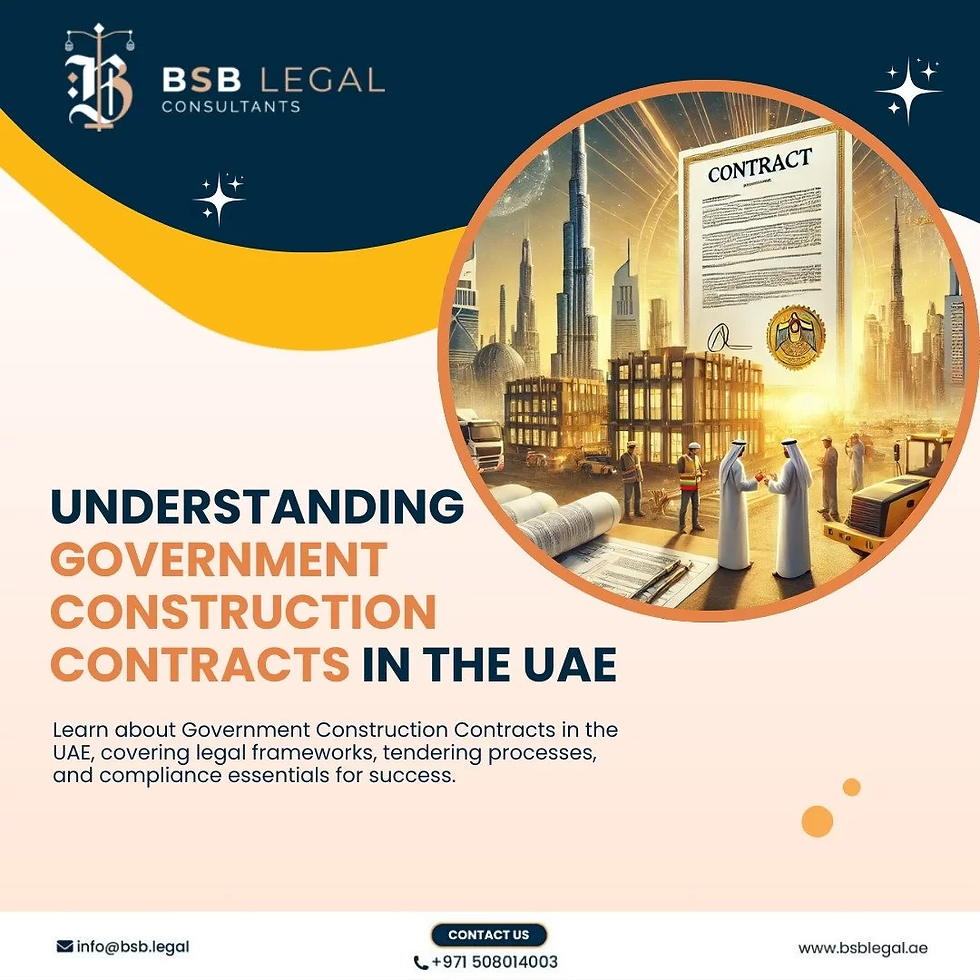Understanding Government Construction Contracts in the UAE
- BSB Legal Consultants

- Dec 3, 2024
- 2 min read
The construction industry plays a important role in the development of the United Arab Emirates (UAE), marked by iconic projects and substantial investments. Government entities are central to many large-scale construction endeavors, making it essential for contractors and industry professionals to understand the nuances of government construction contracts and related dispute resolution mechanisms.

Key Aspects of Government Construction Contracts
Arbitration: The Preferred Method for Resolving Disputes
Arbitration is widely recognized as the favored method for resolving disputes in government construction contracts in the UAE. This preference arises from its multiple advantages:
Avoiding Local Courts: Foreign parties often choose arbitration to bypass complexities in the local legal system.
Privacy: Arbitration proceedings are confidential, unlike court cases.
Expert Arbitrators: Matters are reviewed by arbitrators with specialized knowledge of construction disputes.
The Role of FIDIC Contracts
Many construction projects in the UAE use the FIDIC suite of contracts, which emphasize a tiered dispute resolution process. This process encourages amicable settlements before escalating to arbitration. Legal precedents, such as Dubai Cassation Case No. 167/1998, stress the importance of adhering to these procedures, including referring disputes to an engineer or dispute board before arbitration.
Government-Specific Requirements
When contracting with government entities, additional layers of regulation come into play:
Federal government entities must secure approval from the Ministry of Justice for arbitration agreements.
Local regulations, such as those in Dubai, require compliance with specific arbitration-related procedures, often designating Dubai as the seat of arbitration.
State Immunity and Enforcement
Challenges with Sovereign Immunity
State immunity is a critical factor in government construction contracts. While contracts may stipulate arbitration outside the UAE, UAE law often governs the substantive aspects of disputes involving government bodies.
Government entities enjoy immunity from execution under UAE law, which can complicate enforcement. Even if a waiver of sovereign immunity is signed, UAE courts exercise caution in enforcing such waivers, citing public policy concerns. This highlights the need for detailed arbitration clauses and expert legal counsel to address potential hurdles.
Importance of Due Diligence and Compliance
Before entering into government construction contracts, thorough due diligence is essential to ensure accuracy and enforceability. This process involves evaluating technical, commercial, and legal aspects to mitigate risks and ensure successful contract execution.
Technical Due Diligence
Assess the project’s scope, engineering needs, and environmental impact.
Ensure regulatory compliance and identify potential challenges.
Commercial Due Diligence
Evaluate budgeting, funding, cash flow, and profitability forecasts.
Analyze market conditions, competition, and revenue streams.
Legal Due Diligence
Review the contract’s terms and conditions for compliance with UAE laws.
Verify licenses, permits, and approvals to identify legal risks or liabilities.
Ensuring Contractual Compliance
Adhere to the contract’s terms and deadlines.
Maintain transparent communication between parties.
Address discrepancies proactively to prevent disputes.
Conclusion
Government construction contracts in the UAE come with unique complexities that demand careful planning and adherence to legal standards. Understanding arbitration procedures, state immunity, and contractual obligations is crucial for successful project execution. By conducting comprehensive due diligence and seeking expert legal advice, contractors and stakeholders can navigate these challenges and ensure smooth operations in government-led construction projects.



Comments